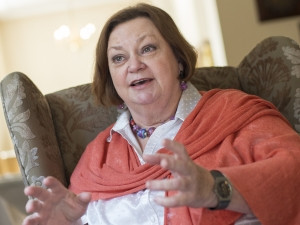
Before infrastructure investment takes place on a scale needed by South Africa, government must entrench investment-friendly policy and market certainty. The ICT white paper, which is being massaged into legislation, does not do this.
This was the message from MP and shadow minister of telecommunications and postal services Marian Shinn, presenting at the seventh annual Fibre to the Home (FTTH) Council Africa Conference in Cape Town yesterday.
The ICT white paper is aimed at facilitating faster shared economic growth, improving service delivery and radically transforming society. But, said Shinn, it falls short.
"South Africa's technology industry has some of the most innovative and nimble operators - they get things done, and we rely on them to come to the fore with good ideas and Internet structures. It is in this environment that we need a strong and independent regulator and competition commission to guard against monopolies and duopolies, to ensure a competitive environment that is conducive to enterprise incubation and consumer choice," said Shinn.
Huge investment required
Last month, the United Nations published its Global Broadband Progress Report 2017, which showed that while 48% of the global population is now online, around 3.9 million people still do not have access to the Internet, and the digital divide between developed and developing countries is growing.
Shinn noted the report distinguished between starter, adopter and front-runner nations, and that South Africa is classified low on the rankings in the adopter category.
"The report emphasises that broadband is no longer the ultimate goal, but rather the first step to using ICT infrastructure to deploy the other four core technologies: data centres, cloud, big data and the Internet of things," said Shinn.
"For nations to grasp the economic impact of these core technologies, a huge investment in infrastructure must be made.
"The report states that every $1 of additional ICT spend made could bring a return of $3 to a nation's GDP. This is significant money, and should encourage government, service providers and entrepreneurs to strive for growth."
Broadband Game-Changer
Shinn said the Western Cape's Broadband Game-Changer, a 10-year project launched in 2014 which aims to connect all provincial buildings and public facilities across the province in line with SA Connect, is leading South Africa's connectivity race.
As of last month, over 1 200 schools have been provided with broadband infrastructure connected to a dedicated schools network. Of these schools, 1 139 have fully-functional broadband services activated, with the remainder being addressed before the end of the year.
Two hundred rural libraries and museums, and more than 400 sites, including administration centres, hospitals and community health centres, have been provided with broadband connectivity on a dedicated network.
"We are striving towards a Western Cape where every resident in every town and village has access to affordable high-speed broadband services, the necessary skills to effectively utilise this infrastructure, and is actively using it in their daily lives."
Shinn emphasised the importance of partnerships between government, service providers and communities in the success of this rollout.
Share